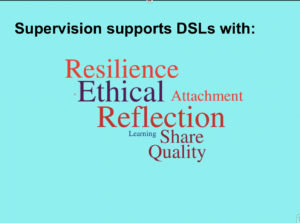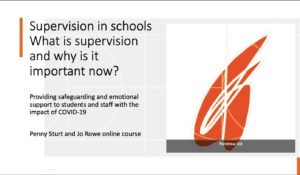FREE webinar – Supervising to safeguard in schools
July 6, 2020 @ 11:22 am
I am delighted to be teaming with my co-author Jo Rowe and Jane Wonnacott, safeguarding expert and Lead Reviewer in the recently published St Paul’s Serious Case Review in a FREE online webinar, Thursday 16th July at 4.30pm introducing the topic of supervision to safeguard in schools. We have considerable expertise in supervision and safeguarding and ideas about how safeguarding supervision can work in schools. If you are a school leader and have questions about what supervision is, how to fit it in to already full timetables and why do it, this is an opportunity to find out more. Please register here
Supervision in schools now
June 4, 2020 @ 2:50 pm
Supervision in schools is topical now. Schools are dealing with incredible pressures and staff need support. Supervision is designed to focus on the needs of children, staff and schools and find creative ways to meet those needs. There is growing expectation that safeguarding staff are offered supervision. As schools recover from lockdown and more children return to schools the unique experiences they have encountered will require a more differentiated and attuned response than would usually be the case in coming back to school after a break.
Participants on our training have valued the opportunity to think about what supervision is, why it is important now and finding out how it could work in schools. It is especially important now as schools prepare to welcome more children back in the next few weeks and in planning for the next academic year. If you want to find out more about supervision our blogs in May have more detail. Alternatively book here for our next course.
Supervision now: emotional support and self-care for school staff during ordinary and extraordinary times
May 27, 2020 @ 12:20 pm
This blog is co-written with Jo Rowe. We are keen to promote supervision in schools and why we think it is such an important time now for schools to have supervision available for them.
What have we observed happening in education during a pandemic? It is our belief that schools have risen to the challenge of working with and supporting the children and young people in their care, as well as their families. Jo has been working with schools that are teaching the children of keyworkers, children with Education and Health Care Plans, children with a range of additional needs including those on the autistic spectrum and with anxiety, and those most vulnerable children in their communities. We know schools that are telephoning children and young people, and parents and carers on a weekly and sometimes daily basis. We know schools that have developed their IT to reach out to, teach and support children using Microsoft Teams, Zoom, Google classroom, and who are setting weekly challenges on their school websites or Facebook pages for children and parents to enjoy together. We’ve seen some great YouTube videos. We know schools that are setting and marking work online to keep children learning, particularly those who need the structure and routine. We know schools that are sewing masks and scrubs for Health Care professionals. We know schools that are making and delivering meals to ensure that vulnerable children in society are having at least one meal a day.
Whatever your role, school staff are helping the children, young people and their parents and carers in their local communities. Schools have always been, and continue to be, an important focus of support in their local communities.
The COVID 19 pandemic is global and has affected everybody living in the UK. Everyone has been locked down, and yet for each person that has produced a unique experience. Some children will have lived in families shielding someone at high risk of dying should they catch the virus, others will have witnessed exhausted, stressed and anxious parents trying to work (or worrying about not having work /income) and home schooling and others will have been bereaved. There will be a huge range of variables. The universality of the pandemic will produce shared challenges – what does ‘school’ mean now? How will social connections be made at a safe distance by managing to keep everyone apart? How will those social connections ensure the emotional responsiveness children and young people require with adults and their peers to learn and develop. How will the underlying anxiety about the uncertainty of who is at risk, how will the virus be managed and what impact will it have, be managed in such a way children feel safe enough to learn?
As schools prepare for more children and young people to return to their educational settings, whenever this may be, they will now face these new challenges. Schools will be considering the health and safety of their students, staff and their families. They may be considering whether they need to have PPE (personal protection equipment). They will be thinking about creative ways to ensure safe physical distance whilst maintaining social contact. They will be thinking about how to transition children back into their school settings and meeting their emotional and mental health needs whilst developing their social interaction and communication skills while maintaining a safe distance and possibly wearing a mask. There may be increased anxiety from students, staff and their families. And, there may be experience of bereavement for the children and young people, their families, school staff members and colleagues. How can school staff manage all these challenges and maintain their own well-being?
If people are exposed to high levels of anxiety and traumatic events without the opportunities to process and make sense of their experiences we know there is a risk of secondary trauma (sometimes known as vicarious trauma or burn out). Staff may become unwell or react unexpectedly. For some people they fear that catching COVID-19 may be life threatening and living with this anxiety could severely inhibit their usual functioning.
There are many ideas to support emotional and mental health needs in your personal life. Our particular favourites are: daily exercise in the form of a walk, being kind to others, a gratitude practice and being mindful. However, the focus of this blog is to consider what support you can receive in your professional life. Our collaboration began around understanding the benefits of supervision for ourselves in our individual careers as an Educational Psychologist and a Social Worker and noticing its significant omission in education.
Supervision that we have received, and offer to others, formalises an expectation of being supported to do the best job we are capable of. It facilitates discussion about anything that worries us, to draw on other’s experiences, knowledge and skills to brainstorm ideas. It allows us to ask for help when we need it. Supervision provides emotional support in an emotionally demanding and exhausting job. Supervision is a professional conversation. It is a method of offering managerial input, emotional support and enhancing professional development to staff. We have long advocated supervision in schools for those involved in safeguarding and promoting pastoral care of students. In these extraordinary and unprecedented times, never has supervision been needed more in our schools.
As schools move into the next phase they will encounter responses to the pandemic and reconnecting after lockdown that belong to the whole school, there will be individual needs expressed by staff and students and for some their ability to reconnect with school and learning will need specialist attention. The staff team will require creative, compassionate spaces to explore and process these experiences and find solutions that work. It is our belief that supervision could be that space.
If you want to find out more please click here
Alternatively contact me through the website.
Online training – Supervision in Schools
May 13, 2020 @ 4:09 pm
Has the time come to introduce supervision into your school?
Jo Rowe and Penny Sturt, co-authors of a guide to introducing supervision into schools are offering supervision training online, targeted at school leaders, Designated Safeguarding Leads and pastoral leads. Supervision has long been available to social workers, psychologists, counsellors, school nurses and others working with schools, it is surprising that it has not been more available to staff in schools and is beginning to be recognised as a gap that needs filling.
As schools prepare to resume face to face teaching how will they do so safely with sufficient support for students and staff. What will the ‘new normal’ look like, what adjustments to learning will be needed, e.g. the recovery curriculum? The Integrated Model of Supervision is a framework for enabling emotional support, reflective practice and critical thinking. It is also key to the development of a safe organisation where the safety and wellbeing of children is at the core of day to day practice. We have piloted it in schools and have ideas and experience about what makes it workable in schools. There are similarities to coaching methods which many schools already use.
In recognition of the unique challenges facing schools we are proposing the following online training. Book here
2 x 2 hours online training seminars for 10 delegates.
- What is supervision and why do it? Aimed at those in school leadership to think about what the current challenges are as schools prepare to resume. How supervision may be a useful space to explore the needs of staff and students arising from their experiences of life under lockdown.
- How to introduce supervision to school – 16 pieces of a jigsaw This follow up training builds on the first session and prior attendance on the first seminar is required. Explaining the Integrated Model of Supervision and how to put it into practice drawing on our experience of working with staff in schools to introduce supervision to schools. This session will look at how to put the building blocks in place for introducing a supervisory framework.
The most effective handout for this course is a copy of our book, designed to support training and to assist in introducing supervision into schools, we have provided templates and ideas that are integral to our approach.
Additionally there is the option of ongoing supervision/consultancy to support school leaders embed supervision into a school framework. Without the experience of your own supervision it can be hard to offer it to others and for that reason we would encourage Heads or DSLs to take up the offers of consultancy or supervision either from Penny or Talking Heads.
Trainers Jo Rowe and Penny Sturt
Penny Sturt is an independent trainer, consultant and registered social worker. Following her advanced social work training, which developed her interest in supervision, Penny has been delivering supervision training as an associate with In-Trac Training and Consultancy Ltd/ Research in Practice. Penny ran the pilot for schools having followed up requests for supervision training in schools. Penny has a long-standing interest in safeguarding and supervision across multi-agency settings. She has run training courses and consulted with health, social care and educational settings around supervision.
Penny Sturt tweets @practicematters
Jo Rowe is an Educational Psychologist working for a Local Authority. Jo currently provides group supervision in a range of settings, and participates in group supervision with her team members in the Educational Psychology Service. Jo has 20 years experience as an Educational Psychologist, with familiarity of working in a range of school settings, and supporting children and young people with additional needs and school staff in these settings. Jo is keen to apply her knowledge and experience of group supervision to the wider school community. She recently extended this interest by researching the impact of supervision for school staff with a safeguarding role.
Jo Rowe tweets @JoRoweAuthor
Next Course Day 1 Thursday 2nd July 9.30-11.30am
Day 2 Thursday 16th July 9.30 -11.30am
Finding your way – Coping in the time of COVID-19
April 15, 2020 @ 12:46 pm
This is a short blog post with 3 main points designed to help you cope at what keeps being described as the strangest times of our lifetimes. Everyone has a slightly different challenge at present, so this is deliberately generalised. I am posting it on my website but will also be coming back to the issues on Twitter @practicematters and Facebook @pennyselfcare and am happy to discuss any points further. There are 3 main points I wish to make.
- Prioritise your well-being.
- Be realistic about managing your expectations of what you can do
- Stay connected to your emotional support group
1.Prioritise your wellbeing
Staying physically fit and emotionally well are essential. They may be bigger challenges now so think about how you can make sure you find time to exercise and eat healthily. Part of a coping mindset is to make the most of the opportunities that are available. If you are an adult at home with others, some of whom depend on you, then prioritising your own wellbeing is key to how well you all cope. The Government advice includes an expectation of ongoing exercise because it is such a key part of feeling ok about ourselves.
So top priority for managing your time is to exercise and have regular healthy meals. In my family we choose to exercise at different times, I like to start the day, and others prefer to end it, with exercise. My personal challenge is to make sure I complete 12,000 steps a day. One of my friends in the shielded category (no outside time) is running in front of the TV several times a day and beating me regularly to 30,000 steps. Others have run a marathon on their treadmill or in their garden. Many are doing #PEwithJoe or Yoga with Adriene. Some apps are free at the moment with exercise routines available that can be done in the home with no equipment. It matters less what you do, but that you do something that makes you out of breath and raises your heartbeat.
There are great benefits from going outside, so do take advantage of that time you are permitted to be out to notice the world around you which is changing daily. If you remember how important it is to you, and those you live with, to keep exercising, you will do it.
- Managing your expectations
Although this is useful advice in general, it is particularly important to pay attention to this at the moment. Set your own goals and notice when you achieve them. Make them realistic for your current situation and avoid using measures from a different time. If possible avoid comparison with others (on social media) and concentrate on what you are achieving. Making one of your goals doing your desired exercise and you will be in a positive mood quite quickly.
I find the method outlined below![]() helpful. What are my main goals for today and what am I grateful for/what was the best thing that happened? There is a space for the ongoing (things that have to be remembered) list but deciding what is your focus each day is useful. At times when I have been overwhelmed it might be my exercise, providing meals and getting a load of washing done. The emotional burdens we encounter will fluctuate but pay attention to what feels achievable each day and notice how you feel when you have ticked it off!
helpful. What are my main goals for today and what am I grateful for/what was the best thing that happened? There is a space for the ongoing (things that have to be remembered) list but deciding what is your focus each day is useful. At times when I have been overwhelmed it might be my exercise, providing meals and getting a load of washing done. The emotional burdens we encounter will fluctuate but pay attention to what feels achievable each day and notice how you feel when you have ticked it off!
What is also important is to notice the things you are grateful for about each day. Asking what the best thing was that happened in each day allows for those unexpected moments that give us joy to be really noticed and treasured. I am sure you are doing variations of this at meals/ in phone conversations as well; what was good about today, what was difficult, the good news / the bad news as methods of connecting; building our expectations of achievable goals and noticing what has brought us fun and joy.
- Staying connected
We are all finding new ways to be emotionally close while we are physically distanced. It is essential to make regular connections with the people who matter to you, whether family, friends or work colleagues. Who are the people you are missing and how do you make sure you still speak to them regularly? Someone said to me how nice it was to see a smiling face which I think is why we are moving to methods that allow us to see, as well as hear, each other. It’s important to notice those mutually supportive friendships and prioritise time to connect to them not just those you know require you to support them.
Social media and technology is helping us be creatively connected. I am constantly amazed at other people’s creativity; since being in lockdown I have taken part in virtual family quizzes, cocktail hours and Easter egg hunts, others have told me about their baking contests, bingo nights, pub quizzes and many more. I’m still trying to get the detail of how to play badminton virtually… Sometimes it’s helpful to have regular arrangements scheduled but there may be times and people who need to be spontaneously reached out to. We are all becoming proficient in online conference calling using a range of methods. My preference is Zoom as it works on all platforms/ range of devices and the app developers have quickly resolved the security issues. However find and use whatever works for you, your friends and family. Despite some understandable reticence all ages are sharing in online conference calling quite successfully when it becomes the best method for seeing those we love and want to remain connected to.
What now?
This was a brief post summarising the key factors for living well in these unusual times. There will be other ideas so please join in discussions on social media. If there are specific queries I can assist with I can be contacted using
@practicematters on Twitter and Penny Sturt Self-care trainer @pennyselfcare on Facebook.
My friend, Trudy Ritsema, IT Courses Dorchester is willing to assist anyone wanting advice about using their own technology or especially the new social media apps that are emerging. She is brilliant at sorting out glitches (by which I mean user errors!) and has helped behind the scenes in this blog.
Recent Work
July 17, 2018 @ 3:17 pm
My new book Using Supervision in Schools is published. I am very pleased that this collaborative effort with Jo Rowe and colleagues in education settings is now in print and available. Training in supervision is also available through In-Trac Training and Consultancy . Please read on to find out more.
As a universal service, education is expected to safeguard and meet the needs of all children, some of whom may have complex issues, and to provide emotional support for children and their families. There are increasing pressures and changes facing schools and teachers across the UK, however unlike other similar stressful professions there is currently a lack of a structured framework to support school staff to deal with the rigours of their role. Supervision is a method of supporting staff with their safeguarding role and with the emotional demands of their work. This guide is designed to act as a consultative document in instigating supervision in schools using their feedback about what worked. It will also help relevant schools to comply with the statutory requirements of supervision in The Early Years Framework.
The integrated model of supervision is an effective model which can be used in a variety of school settings from Reception to Year 13. The first four chapters of the book unpick the core components of the model and the second part of the book addresses the issues arising in schools specifically, describing the supervision pilot the authors carried out across five schools with great success.
The illustrated book will be an invaluable guide to all schools, governing bodies, those trained in supervision, local authorities, national educational advisers and school academy trusts.
‘I have felt the benefit of my own supervision to be very valuable and would like to offer my thanks for this. It takes an informed leap of faith, followed by sustained commitment in order for schools to recognise the benefits longer term. Having done this as a school, I am very willing to advocate the benefits to others.’
(Designated Safeguarding Lead who part in the pilot.)
We have designed training for schools that accompanies the book using the feedback from those who have tried supervision in their schools and my experience of supervising, consulting to and delivering training in supervision over the last 20 years.
Healthy connecting – managing demanding workplaces
March 17, 2015 @ 4:47 pm
When the workplace can make 24 hours a day demands on you how do you switch off and manage to hold onto reasonable expectations of yourself and your colleagues? Questions like this are beginning to filter into contemporary working life. Our flexible ways of working are actually making us feel more trapped than the rigidity of a 9-5 work day. Now we can work whenever we feel like it, many of us are finding it harder to carve out reasonable expectations of when we are at work and when we are not at work. How do you switch off the computer, tablet, phone and deal with the feeling you may risk missing something important?
These dilemmas have been raised both in training sessions and with peers; how to juggle the increasing demands placed by the technological changes brought into modern working life. Whether you are expected to work in close contact with people, because your office has become open plan without quite enough space for everyone, or whether you are working from home and rather isolated from a team environment; how to make meaningful contact and good relationships is a key task of surviving and thriving in a working and productive life.
In response to these questions, this course has been designed to give busy professionals a space to decide where their priorities are and how to reclaim control over their working life.
First course is booking now
Staying connected to the people who matter – family and friends as well as business contacts
Making the unmanageable manageable – what are reasonable expectations of yourself?
Developing resilience strategies – what are the core qualities of resilient people and how can these capacities be developed
Find out 18th May 2015 9.30 -4.30 here
The right way?
February 23, 2015 @ 9:23 am
Enraged by the radio after just a few minutes I switched off and listened to my thoughts. What had enraged me? Yet another politician talking about “the right way”, the “right thing to do”. Refusing to discuss the issues being raised and bull headedly keeping to their script. Is this the way to engage a disillusioned electorate? It reminds me of past leadership failures when a totalitarian viewpoint was promoted and those that differed were “wrong”. After so much focus on the first world war and a recognition that we need to find ways to communicate internationally to prevent future wars why are we still stuck listening to politicians talking about the right way. There is no right way. There are many ways of choosing to live our lives. We need to find political leaders interested and able to discuss differing viewpoints. The solutions to the complexities of how we live require flexibility of approach, listening to unpopular and different views in order to come up with a shared longer term resolution. Politicians able to deal with FUD, fear uncertainty, doubt (Susan Cain, Quiet).
Each of us individually makes up our own mind, guided by those around us, about how we want to live our life. The more empowered we feel the greater amount of choice we feel able to exercise. Some of that empowerment rests in the physical world, money and privilege affect our life outcomes; however there is an element that rests in our internal world and how able we feel to make the most of the opportunities around us. Recognising the ways we stop ourselves taking advantage of the opportunities life presents us with can be an important first step to finding the right life for you.
If you are a woman and would like to find out more about choosing the life you want for yourself take a look here.
What I am known for!
February 2, 2015 @ 7:30 am
“You’re the trainer who insists we take a lunch break”. I was delighted to be greeted by this in the introduction to one of my recent courses. Yes I hope I am known as the trainer who insists on self care. My passion is quality of services available to those who need them and equally passionately I believe that having a workforce that values and cares about itself is an essential ingredient for good quality services and compassionate care.
When I qualified 25 years ago that was enshrined in the practices of social work. Sadly it’s no longer the case. There seem to be expectations that everyone works longer than their contracted hours unless you leave to continue looking after others; children and vulnerable adults. The boundaries around training and leave were kept. Other people managed your absence rather than contacting you and expecting you to respond when you were out of the office.
It seems as if the priority for action has become the system rather than those expecting a service whether that’s a child, vulnerable adult or family member. Casualties in the process also have been the children of the workforce who come very low down organisational priorities and the workforce in terms of their own personal and professional development. Recognising limits to capacity or asserting the needs of others that workers have responsibilities to are seen as weaknesses and vulnerabilities.
No wonder we’re a long way from being able to provide compassionate care to the most vulnerable in our society.
These patterns occur in many professions. Long hours and devotion to work are seen as essential criteria. Rather than living balanced and compassionate lives connected to families, friends and our communities. As we examine how the wealthy live perhaps these values are coming under scrutiny.
So I am pleased that I can unite with other Renew You trainers to buck this trend and offer women safe, nurturing spaces to develop their potential. It is a prerequisite of my Renew You course that lunch, as well as the time to eat it in, is provided.
Signs of Spring v. Bleakness
January 26, 2015 @ 5:00 pm
Today you may notice there are just the first signs of spring appearing. The snowdrops have been blooming in my garden for a couple of weeks; the catkins are beginning to show and the shoots of daffodils and hyacinths are coming. 
However this time of year is also associated with bleakness and a reality check about whether your life is where you want it to be. The return to work after the Christmas /New Year break is often associated with an increase of divorce applications or concern about mounting debts or just a realisation that another year without the changes you wished for has taken place.
Whichever viewpoint you subscribe to, and in reality it could be a bit of both; joining in a group to take action is a good way of doing something differently and thereby beginning a process of change.
Standing on the side lines at a football match a friend wondered aloud whether she should make it her new year resolution to aspire to running the line, this would keep her warmer than spectating but does have the drawback of requiring better knowledge of the rules.
What aspirations do you secretly harbour? Every dream has some motivators and some thing slightly scary to be overcome. Renew You is a 1 day course for women to talk over in a safe environment the excitement of making dreams reality and working out how to manage the challenges. This Spring many Renew You trainers are offering workshops to mark International Women’s Day and Mothering Sunday. Mine is on 16th March and also has the additional treat of a voucher with the Dorchester based House of Health and Beauty. Take a look, it’s a first step to getting the life you want.






